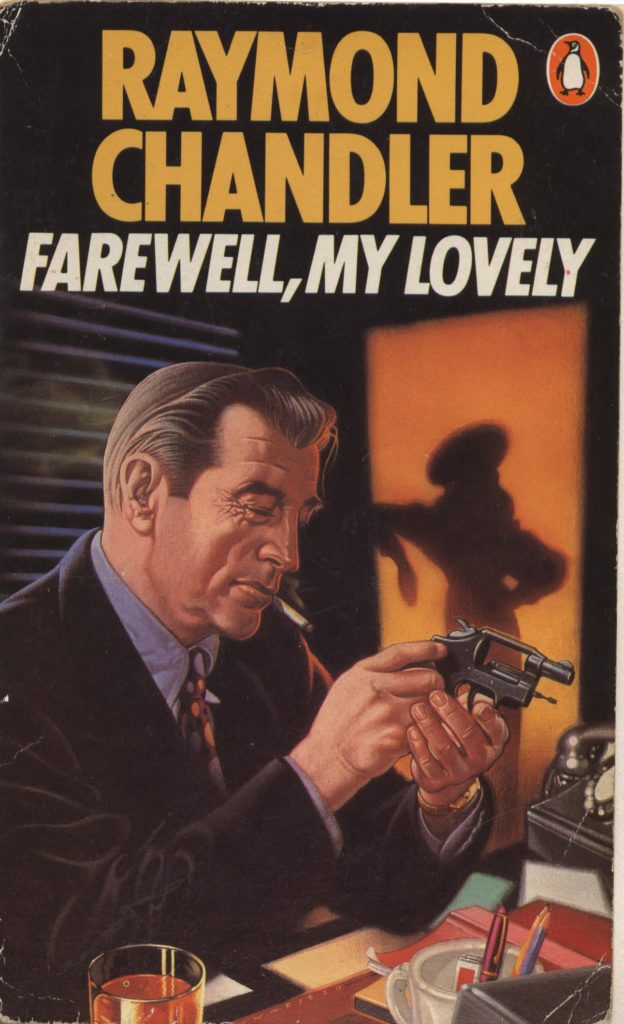Podcast: Play in new window | Download
Subscribe: RSS
In Episode 54, we revisit to one of the masters of hardboiled detective crime fiction, Raymond Chandler, and his acclaimed second novel, Farewell, My Lovely.
Damn, this book is boozy. (And racist!) But also rich with memorable secondary characters (Moose Malloy and Jessie Florian) and Marlowean one-liners.
It’s a classic example of hardboiled detective fiction that finds Chandler at his most Chandleresque.
Get in touch with the show:
Twitter: @pointblanknoir
Facebook: Point Blank: Hardboiled, Noir, and Detective Fiction
Itunes: https://podcasts.apple.com/us/podcast…
Website: www.pointblankpodcast.com
Support the show:
Patreon: https://www.patreon.com/pointblankcrime
Don’t forget to rate us on Apple Podcasts and share the show with your friends!


Loved your discussion of FAREWELL, MY LOVELY. I was especially intrigued by your comments on Chandler’s use of language. My own introduction to his work came during a long summer in Scotland. I was ill much of the time, and a friend there recommended that I fill my down time reading Raymond Chandler. She hooked me by quoting a line–I believe it was from THE HIGH WINDOW: “She was a blonde to make a bishop kick a hole a stained glass window.” That did it for me! I read every one of his novels (except the dismal PLAYBACK) that summer overseas, and I continue to be fascinated by his language to this day. In fact, when I sat down to write my own hard-boiled mystery, SOMEONE TO WATCH OVER ME, I decided that the narrator’s voice was the key to the whole thing, and I didn’t write a single word until my Jack Shannon started speaking to me in his cynical, ironic, funny, self-deprecating way. In any case, it was a pleasure hearing the two of you discuss Chandler in such a probing, insightful way.
Thanks for the comment, Dan, and we appreciate the compliment 🙂
Oh this was a tricky listen. I love Chandler – perhaps because of his British side which certainly comes through in his very American tales. I suspect if he was writing today he’d write aspects of this novel very differently but who knows.
On the ‘Hollywood Indian’ I had assumed that Chandler was being fairly literal. It is a stereotype and it is a white guy playing that stereotype. The good Doctor has him play the part to give him some ‘Indian’ down-home credentials. I suspect he is put in for humour – it definitely doesn’t work now. Racially offensive yes – but is it Chandler pointing out how racially offensive it is?
I have the same feeling about the Molloy murder of an African-American. The contempt for the victim is shown by the LA cops. They were legendarily racist in the 1940s – this is a perhaps an all too accurate portrayal of their attitudes at a time when those attitudes would not have been as obvious to those not directly impacted. Writing a few years later Chandler might have had his narrator hit his readers over the head with it. Back then he may have felt he had made his point and he wasn’t going to push his luck.
So was Chandler a racist or was he accurately reflecting a racist world? Its certainly correct to warn people that find this stuff hard to stomach. Anyone writing like this today would deserve censure. I like to give dear old Ray a little more benefit of the doubt than you did but I’m well aware that I am a white Englishman. Everyone has to judge this for themselves I think.
I appreciate your response, Andrew. Figuring out how to handle racism in Chandler’s work is complicated & something I definitely struggled with when recording this episode. I think it is fair to give Ray some benefit of the doubt, as you do, and I agree that there are many ways to interpret Ray’s choices. I do wish Marlowe was more a knight for racial justice than he appears to be, but he is what he is. – Justin
Did you ever think that Marlowe deliberately set up Molloy at the end of the book to avenge the death of the black person Molloy had killed?